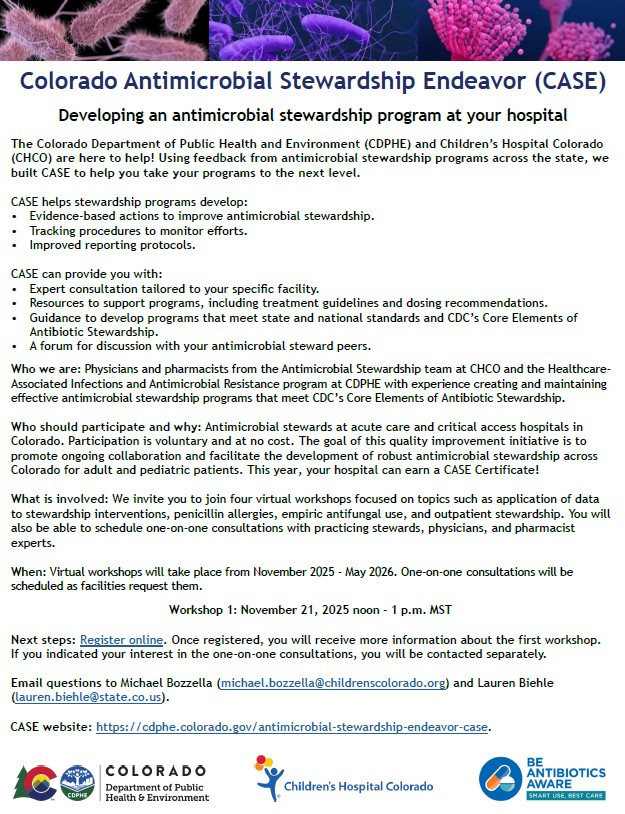Colorado Antimicrobial Stewardship Endeavor (CASE)


About CASE: In August 2021, the Colorado Department of Public Health and Environment (CDPHE) partnered with Children’s Hospital Colorado to start the Colorado Antimicrobial Stewardship Endeavor (CASE). CASE includes physicians, pharmacists, and epidemiologists who provide mentorship and resources to Colorado hospitals that may be new to antibiotic stewardship. Antibiotic stewardship is the effort to measure and improve how antibiotics are prescribed by clinicians and used by patients. Improving antibiotic prescribing and use is critical to effectively treat infections, protect patients from harms caused by unnecessary antibiotic use, and combat antibiotic resistance. Learn more on the antimicrobial stewardship main page.
Through a series of workshops and one-on-one consultations, CASE will support hospital antibiotic stewardship programs to:
- Create evidence-based actions to improve antibiotic stewardship.
- Develop procedures to track and monitor antibiotic use and reporting.
- Extend antibiotic stewardship activities to pediatric patients.
- Develop programs that meet state and national standards and CDC’s Core Elements of Antibiotic Stewardship.
- Interact with antimicrobial steward peers statewide.
- Request one-on-one consultations from the CASE team.
CASE also seeks to provide resources such as treatment guidelines, support for reporting antibiotic use to the National Healthcare Safety Network (NHSN), and links to evidence-based guidelines and tools.
CASE workshop schedule 2025-2026
Date | Presentation Slides |
|---|---|
Workshop 1: Nov. 21, 2025, noon to 1pm | Frontline Pharmacists - Presentation I Recording |
| Workshop 2: Jan. 23, 2026, noon to 1pm | Beta-lactam allergies and antimicrobial stewardship - Presentation | Recording |
Registration does not expire! Join us any time before the last session.
CASE Registration
Antimicrobial stewardship is one of the best tools we have to fight back against antimicrobial resistance. While there are multiple guidelines for common infectious processes, applying them at the local level can be a time-consuming challenge. Children’s Hospital Colorado and Denver Health have partnered with Firstline to create a mobile app to change that.

Firstline houses clinical pathways from Children’s and Denver health, along with antimicrobial dosing information, pathogen information, infection prevention information, and more. It is intended for use in all clinical settings. The app is free to download, and is available on iOS and Android devices, as well as a web-based format. CDPHE supports the Firstline app in an effort to provide antimicrobial stewardship treatment guidelines and resources across healthcare settings.
No matter your specialty or practice, we are all stewards. We can all work together in keeping Colorado healthy, one antibiotic choice at a time.
Use the QR code above to find our app. Once downloaded, you can set your location to Denver Health and/or Children’s Hospital Colorado to access all of our materials. Once in the app, clicking on the FirstLine logo in the top left corner will allow you to toggle between locations to access adult vs pediatric guidance. Contact cdphe_hai_ar@state.co.us for more information or feedback!
CASE is recruiting hospitals to participate in a nine-month quality improvement project to implement Firstline and measure and improve pathway adherence. In collaboration with Children's Hospital Colorado and Denver Health, CASE created a no-cost app through Firstline that contains antimicrobial stewardship-focused infectious diseases guidelines that can be used in all clinical settings.
Enrollment in the CARE PATH program will consist of:
- Using pathway adherence tools created by CASE to measure prescriber adherence to recommended antibiotic choice and duration for urinary tract infection, community acquired pneumonia, and/or skin and soft tissue infection.
- Entering adherence data into a secure REDCap database hosted by CDPHE
- Receiving an individualized feedback report with a summary of adherence data for use by your antibiotic stewardship team. Share your report with your prescribers and hospital leaders or keep it as documentation of your efforts for accreditation.
When: July 2024 through March 2025
Next steps:
- Include CARE PATH in your quality improvement plan.
- Download the Firstline app through Apple or Android Store (see QR code above), and search for Children’s Hospital Colorado or Denver Health.
- Contact Joana Dimo, DO (joana.dimo@state.co.us) or cdphe_hai_ar@state.co.us for more information.
CARE PATH registration
CARE PATH recruitment poster PDF
| Fall Workshop: October 25, 2024 noon to 1pm | Treatment of Urinary Tract Infections - Presentation I Recording |
| Winter Workshop: January 31, 2025 noon to 1pm | Breathing Deep: an approach to Community Acquired Pneumonia - Presentation | Recording |
| Spring Workshop: April 18, 2025 noon to 1pm | More than Skin Deep-an approach to SSTI - Presentation I Recording |
We have expanded CASE in partnership with the Office of Rural Health to offer an antimicrobial stewardship series focused on critical access and community hospitals!
We encourage ongoing participation in CASE for workshops, office hours, and consultations. The goal of the CASE collective is to promote outreach and facilitate discussion among antimicrobial stewards at smaller or resource-limited settings across the state.
We invite you to join four virtual interactive calls with peer facilities and the interdisciplinary CASE team from August to May. Participation is voluntary and at no-cost. Consultations and additional support are available through participation in CASE. Register for the CASE collective by contacting cdphe_hai_ar@state.co.us.
| May 9, 2025 | |
| Caitlin Li, MD, MHQS Attending Physician, Division of Infectious Diseases, Ann & Robert H. Lurie Children’s Hospital of Chicago Assistant Professor of Pediatrics, Northwestern University Feinberg School of Medicine Core faculty, Center for Quality and Safety | Dr. Caitlin Li is an attending physician in Lurie Children's Hospital's Division of Infectious Diseases. As the division QI director, she oversees intra- and inter-divisional quality improvement projects related to infectious diseases at Lurie. She completed dual fellowships in Infectious Diseases and Healthcare Quality and Patient Safety, and she earned her Masters in Healthcare Quality and Safety from Harvard Medical School. She currently serves as the pediatric representative on the Infectious Diseases Society of America's Quality Measurement and Improvement subcommittee. |
| June 6, 2025 | |
| Lisa Dumkow, PharmD, BCIDP, FIDP Clinical Pharmacist, Antimicrobial Stewardship Program Director, PGY-2 Infectious Diseases Pharmacy Residency Trinity Health Grand Rapids | Dr. Lisa Dumkow is a clinical pharmacist in infectious diseases and antimicrobial stewardship at Trinity Health Hospital in Grand Rapids, MI. She is also the program director of the PGY2 Infectious Diseases pharmacy residency program. Dr. Dumkow's practice and research interests include precepting, expanding clinical pharmacy practice, and antimicrobial stewardship in inpatient and outpatient settings. She received the 2024 Outstanding Clinician Award from the Society of Infectious Diseases Pharmacists (SIDP) and currently serves as the President-elect of SIDP. |
| Date | Presentation Slides |
|---|---|
Workshop 1: Oct. 4, 2024, noon to 1pm | Nurses in stewardship - Presentation I Recording |
| Workshop 2: Feb. 07, 2025, noon to 1pm | Step it up - an approach to diabetic foot infections - Presentation | Recording |
Workshop 3: May 9, 2025, noon to 1pm | Quality improvement in antimicrobial stewardship - Presentation I Recording |
| Workshop 4: June 6, 2025, noon to 1pm | Going home - antimicrobial stewardship at transitions of care - Presentation I Recording |
| Date | Presentation Slides |
|---|---|
| Workshop 1: Nov. 17, 2023, noon to 1pm | “Short is in” Antibiotic Durations for Common Infections - Presentation | Recording |
| Workshop 2: Feb. 2, 2024, noon to 1pm | Expanding your influence to improve antibiotic use in outpatient settings - Presentation I Recording |
| Workshop 3: April 5, 2024, noon to 1pm | Making the most of AUR - Presentation I Recording |
| Workshop 4: June 14, 2024, noon to 1pm | Introduction to CARE PATH Initiative: Colorado Antimicrobial Resources, Education, and Pathway Adherence Tools for Hospitals - Presentation I Recording |
| Spring 2023 | Presentation slides |
|---|---|
| Jan. 13, 2023 | Guideline development and adaptation - Presentation | Recording |
| March 24, 2023 | ASP Data Management and NHSN AU Module Basics - Presentation | Recording |
| May 19, 2023 | Intersection of Diagnostic and Antimicrobial Stewardship - Presentation | Recording |
| Fall 2022 | Presentation slides |
|---|---|
| Nov. 18, 2022 | Stewardship in the community and critical access settings | Presentation video |
| Spring 2022 | Presentation slides |
|---|---|
| Jan. 21, 2022 | Stewardship Part 1: Why, who, how to keep track, and who to ask |
| Feb. 25, 2022 | Stewardship Part 2: Pharmacy Power |
| Apr. 22, 2022 | Stewardship Part 3: It starts with a handshake |
| June 24, 2022 | Stewardship Part 4: The Larger Team |
April 18, 2025 | |
| Dr. Neena Thomas-Gosain, MD, MHS Assistant Professor, Medicine-Infectious Disease, University of Colorado School of Medicine | Dr Thomas-Gosain is an infectious diseases physician and Antimicrobial Steward at the University of Colorado Hospital. In addition to her clinical work, she has participated in projects designed to reduce antibiotic prophylaxis in the context of prosthetic joints and dental procedures, and interventions to reduce antibiotic use for viral URIs. |
CASE one-on-one consultations
People from our two teams work together to troubleshoot difficulties and help develop plans for improving your stewardship program over a 30-60 minute session. These sessions are tailored to your specific needs and situations.
To schedule a session, email Michael J Bozzella DO MS (CASE Lead) at michael.bozzella@childrenscolorado.org or CDPHE at cdphe_hai_ar@state.co.us.

